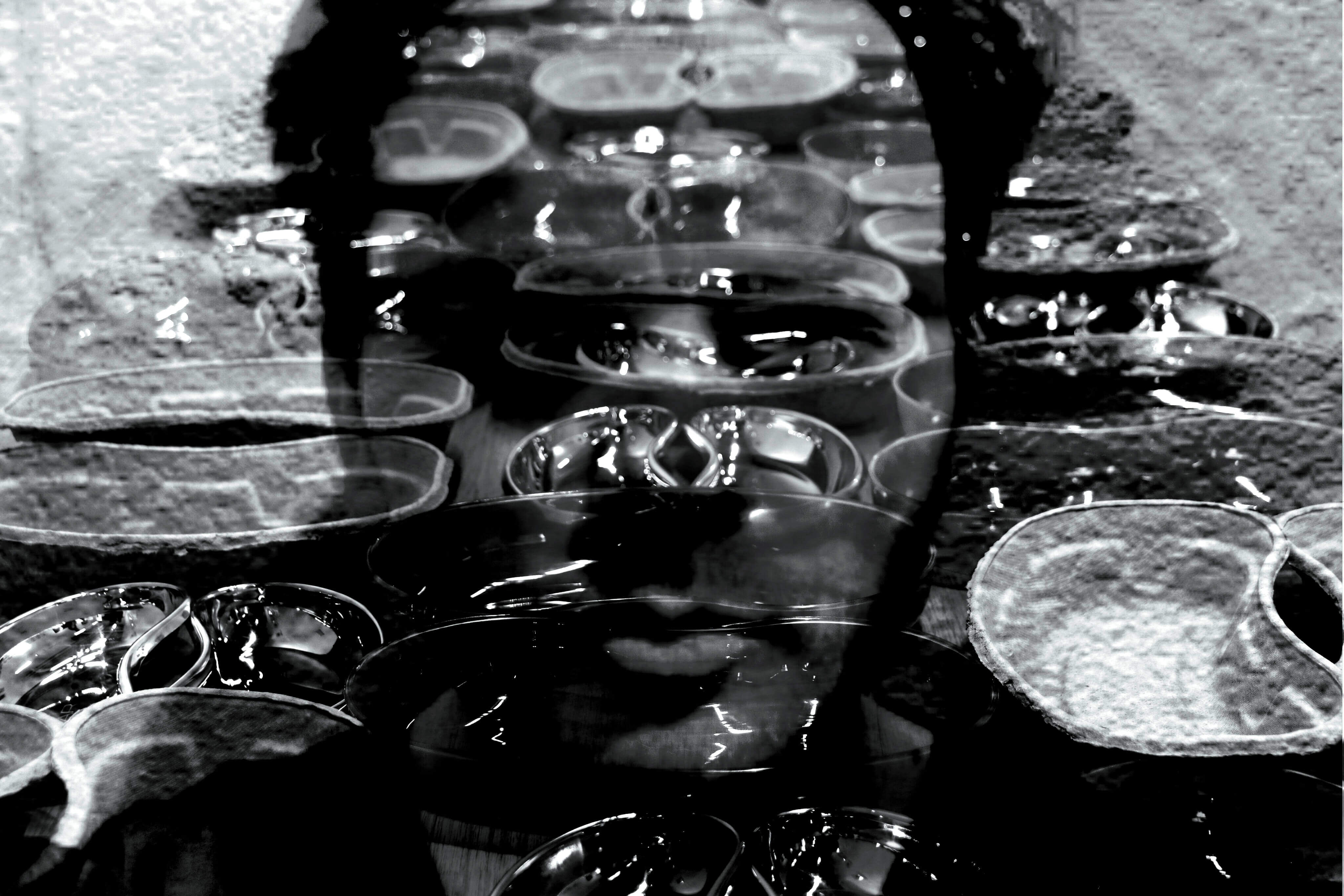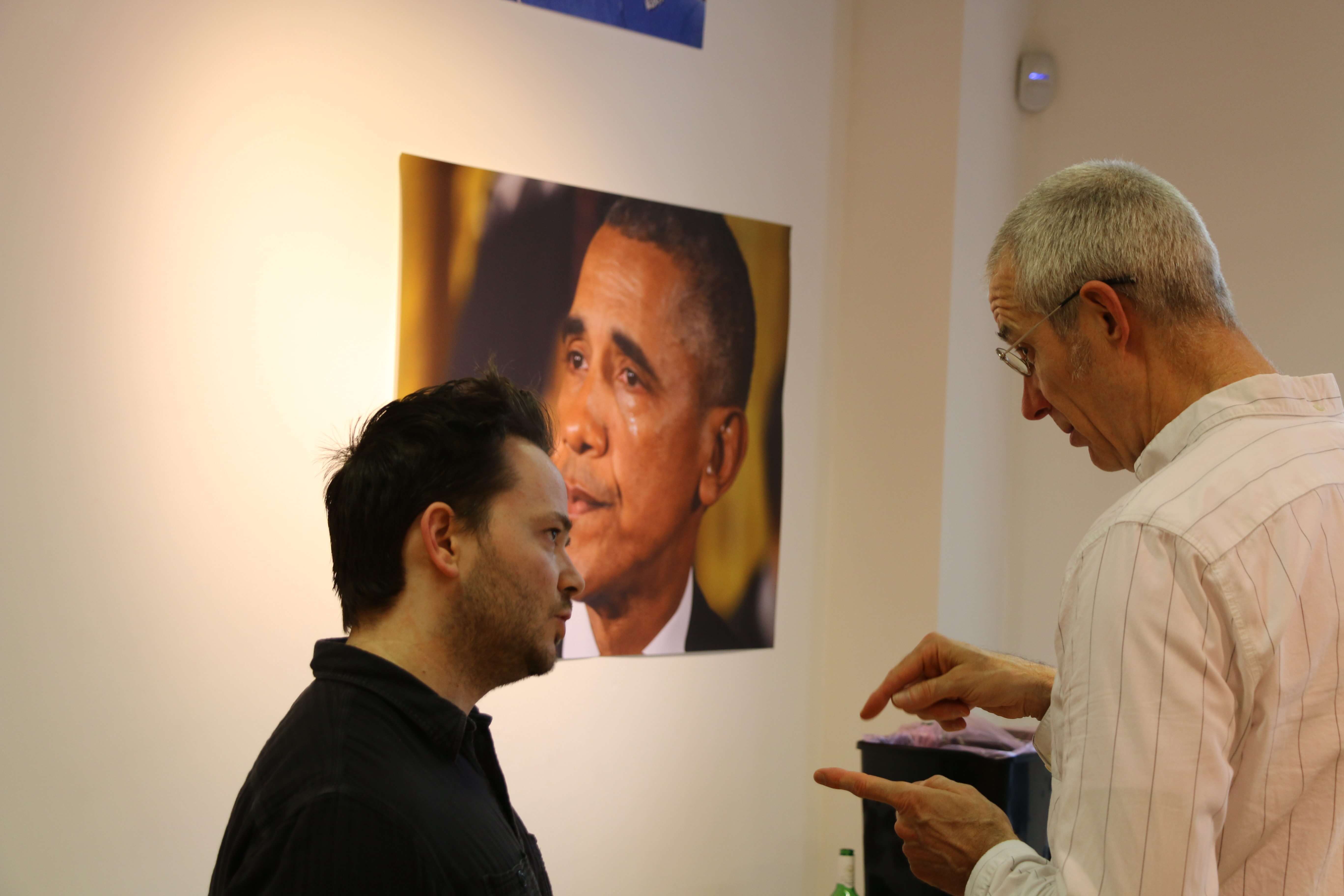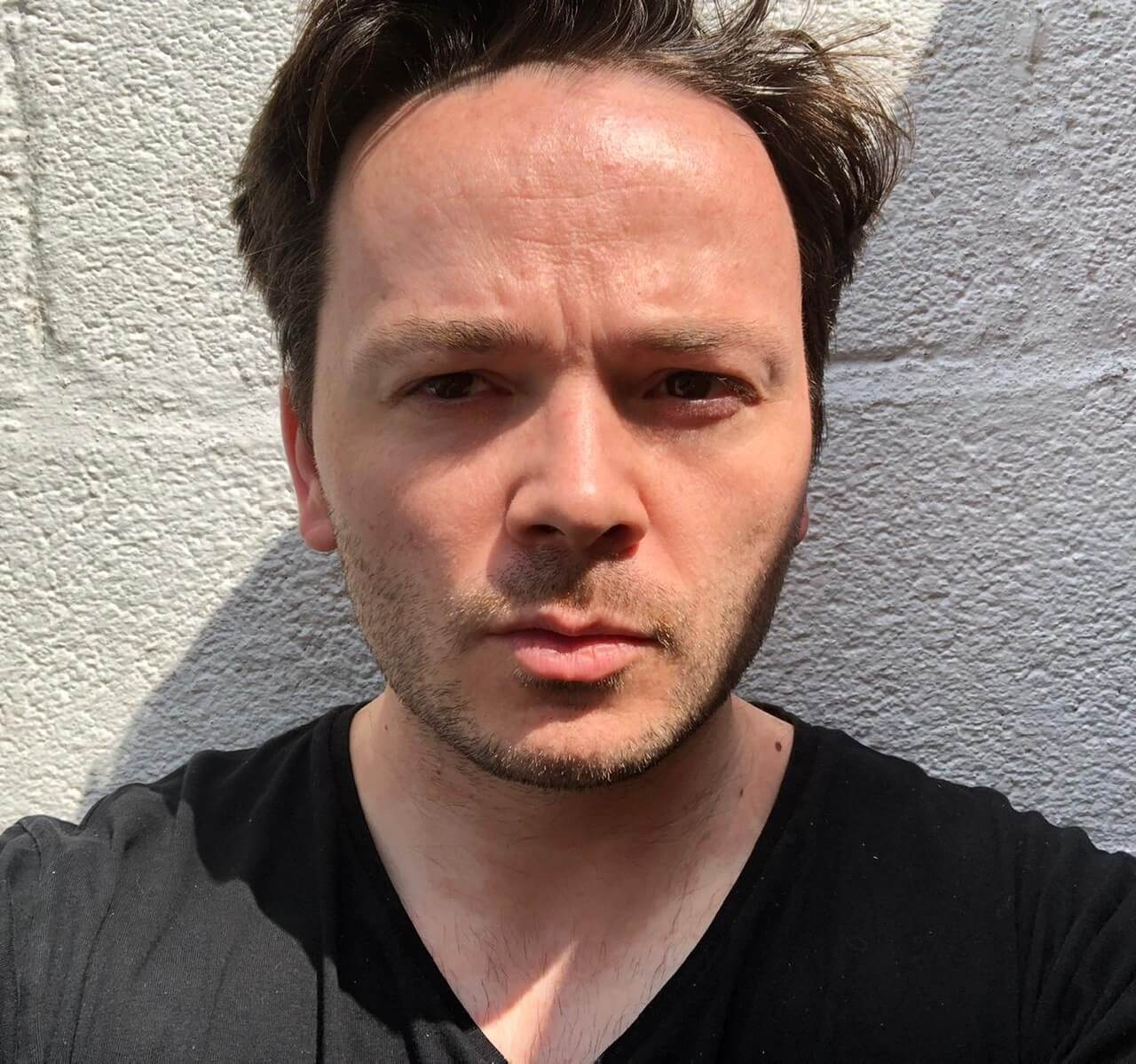by Jeremy Gluck for GS Artists
Based in Swansea, Scott Mackenzie graduated from Swansea College of Art in 2016 with a degree in Fine Art. His work is primarily concerned with issues of inequality and identity politics in the U.K. Using a range of mixed media from photography to sculpture and text that incorporates symbols and motifs that playfully construct a sense of ‘who we are’ and where we may be going, his latest show, NOTHING HAS CHANGED, opened at GS Artists in early June, simultaneously holding up a mirror to the last fifty years – hence the show’s subtitle, ABERFAN TO GRENFELL – and offering a cross-section specimen of the collective consciousness of Britain sliding over the apparent precipice that is Brexit, and a wider world self-absorbed as ever in its dynamic yet entropic circus of the mind and body politic.
Approaching an event at GS September 6th featuring an in-conversation between Scott and GS directors (Scott is himself a director of the gallery) and interns, I had the opportunity to talk with him about his show.
JSG (Jeremy Gluck) Scott, has nothing changed?
SM (Scott Mackenzie) Maybe because it’s easier that nothing has? Maintaining the status quo is what we usually want, it’s convenient, comfortable, you don’t have to do anything…I don’t think we want things to change. Maybe we want someone else to think and change things for us? Is that too cynical?

JSG No, it seems that our society and culture is adapted now to spare us a great deal of thinking.
SM (laughs) Maybe I’m the offshoot of it? Of that dumbing down of culture, that late 90’s – I don’t know, maybe I’m just blaming reality TV, but that’s too easy.
JSG Easy is tempting. What influenced the title and content of NOTHING HAS CHANGED?
SM What really grabbed me was that Theresa May line, “Nothing has changed”, that kind of haunted her through her farcical electoral campaign and election that she should never have called. And that kept on coming back and back and back. I felt that it summed up a lot about how things constantly repeat. And also I felt some sort of personal attachment to it that it kind of stuck, I latched onto it.
JSG In your perspective, how do you do change things? Art? Rioting? Boycotting Poundland?
SM Personally, I’ve always felt one of my problems was that I’ve always sort of stood still and waited for a miracle to happen. And you end up standing in a place of great uncertainty, unsure what’s going to happen next. But you pray for a miracle, I think I’ve always done that. That’s sort of my mindset, Oh it’ll be fine, something’ll come up, there’ll be this big great rupture and everything will be sorted. I’ve sort of done that with my art practice. Maybe not my art practice, but in terms of “a wise man makes his own opportunities rather than wait for them”. I’ve always been too laid back, not proactive enough. I have this constant repetition cycle of thoughts in my head. I hate my job but I’ve never applied for another job…
JSG So, a degree of stasis, perhaps?
SM Yes. But I was conscious about my art practice – regarding the starting point – was to do something different and that the idea dictates the technique. And I’ve never been precious about, uh, the medium, the art school philosophy of a medium, you know, a hierarchy of medium. So I feel like the work changes and at the moment, this is just what’s been going on in my head and what I’ve been consumed with.
JSG What strikes me is the immedicacy of the work stems from, and perhaps what adds to the spontaneity of it, has been doing it in the gallery, with time pressure almost out of a vacuum to create something that surprised yourself?
SM Yes. I had some ideas going in, right? They constantly change and I mean, yeah, once you start getting your ideas out and into physical form, they morph and change. And being in that space. You know, I’ve always had the group, with shared studio spaces. So, the solitude…and it’s a generous space.
JSG The kidney dishes, that’s a very interesting statement. When I saw a photo of them on the website, and looked at it objectively, a lot of people wouldn’t know what that is initially, that adds to its power. It adds to its charm, it’s abstract in a sense. And the balaclavas, which I would never conceive of myself…
SM I just find them striking. The thing is with the kidney bowls and the balaclavas, they are almost instant ready-mades, that pack a punch visually. Maybe the starting point was just thinking about Pussy Riot a couple of years ago and that’s still like a backdrop to the current political climate. I liked the thought of “keyboard warriors” and these kind of masks that we wear and there’s something menacing about it physically. At the same time, it’s kind of laughable, boyish. What intrigued me about them is that they have this comical edge as well as being slightly like a black comedy, but I think what I really liked about them was finding a way to use them and bringing them together, headbutting each other. All going into that silhouette that speaks about toxic masculinity and other buzzwords of the age. I think many of them and the kidneys are quite good, quite mysterious objects as well. There’s something seen but unseen, they’re quite specific…
JSG And you told me that the kidney dish statement relates to the NHS, which of course is a symbol for a lot of what’s happening in Britain, and the world to an extent.The words engraved in each one. I liked the fact that they’re on the floor and you have to look down: automatically they symbolise, for example, the degradation of the NHS and of the state, the NHS is being looked down upon and you’re looking at the dishes and you have to look quite close to read what’s engraved in them. They seem to have no meaning in a sense. Very ephemeral, on that line, that balance. What is your further perspective on that particular piece of work? That would be a great installation on it’s own.
SM An early sort of catalyst for that work was when I played around with medical equipment; in my final degree show I had a medical examination bed in an installation. I had previously used vomit bowls. A precursor was my fascination with Dead Ringers but that was more about people with a pseudo-sexual use of medical equipment. So I have those kind of things in mind, in my head, but for me it was about this need to, um, remove something? These kidney dishes are there to take something, hold something that has been removed from you. And I felt like that’s what we need. Some sort of exorcism, it’s kind of like we need to expel something, to get rid of something. So that’s kind of interesting…probably a bit tenuous, but that was my idea.
JSG Interesting image and analogy. There other associations in a sense? You know, the whole idea of excising or removing something and the viral nature of our culture, a viral element. There’s a cancerous element, also a mythological element. In terms of the Hydra in Greek mythology where you cut off one head and two or more appear, it’s perpetuating itself and always one step ahead and warping any attempts to restrain it that would be emblematic of what I get from the energy, and statements in your show. Personally, I suppose that it’s like you’re racing to cut off various heads with the foreknowledge that two more are going to grow back in their place anyway, but it’s freezes a moment, it is a form of resistance, of protest. I don’t find it passive. It’s got a static quality, which I really love about it. And then when you have the photo manipulation images series, especially the one with Elvis and the Twin Towers, it traces a big arc, from the Fifties to now, which is sort of a neat 60 years in which in a way nothing has changed. The whole nature of change, it captures that sense of when you’re alive, which I assume I am, that life can have a static quality. It’s always the same, but it’s always different. And then you read about people who do, whose lives are crammed full of adventure and variety and constant alteration of circumstances. Even that doesn’t quite answer to a situation where within yourself, when people always say, Oh, you know, what I’ve changed or you’ve changed. Yet there’s some essence which is unchanging. I think in a way you’ve succeeded in capturing that. Do you find that statement, “Nothing Has Changed”, despairing, discouraging, or just a reflection?
SM It’s probably a combination and maybe this is a get-out clause, but it’s a combination of all those things because, you know, madness is doing the same thing and expecting a different result. It’s just frustrating and confusing.
JSG Do you want to continue living in Britain? If you could leave Britain comfortably now, would you? It is a temptation for a lot of us.
SM Yeah, I mean I keep…yeah, daydreaming, but I don’t know. I don’t really envision my, um, I mean occasionally I think of, ah, maybe Tuscany! If I imagine myself when I think of the future, I’m always here. I don’t know.
JSG NOTHING HAS CHANGED as a statement, as a title and so on? And obviously you have deep roots in Wales, but “Brexit”, or “Brexicide”, as I refer to it…your show does have resonances with Brexit, which is very interesting. It might be seen as retrospective in the sense of the images of May and so on. The Wales of the post-Brexit environment, and of course there could be a kidney dish shortage, so it’s just as well you did your show now before the collapse of British society. Ten weeks to get a kidney dish, and balaclavas don’t even ask! They’ll be in great demand for bank robberies. But it’s an interesting question as a Welsh artist, with a deep connection to Wales as part of your self-concept, it strikes me that working in a few months, suddenly in a post Brexit environment as an artist that’s going to be interesting, no shortage of material, but in a way you could almost foresee doing a sequel. Now it’s the crunch. If nothing changes now, then we’ll really be wondering what it takes. So I look forward maybe to a future show of yours that would bear on that if you are inclined that way.
SM There’s loads of scope. I wonder where [the change will come from]…I don’t really see it in the current political climate in the sort of mainstream, it seems quite on the fringes. I don’t quite see it in the establishment as it were, which is no bad thing, but I just don’t see that sort of like anger or even questioning at the moment. I don’t know, maybe I’m being naive, but that’s another reason why I wanted to create something.
JSG Yeah. There does seem to be a strange atmosphere with art because at the moment, the scene’s self-consciously saying all the time that it’s fighting and protesting and resisting and whatever. It’s politically oriented. But does this scene have more than a kind of dryness that’s like, where’s the juice?
Your show is kind of strange. It’s implicitly and explicitly quite different, but I find it has a kind of stillness at the core explicitly. There is a loud statement about the past, present, and future, which are the same thing, you know, and how they merge and then become whatever. It’s like art has become almost a function. It’s like it’s that “the lady doth protesteth too much” saying all the time, “We’re doing this. We’re doing that.” There isn’t anything like Art Rebellion, though. There’s little unity…
SM There’s no anger.
JSG No anger, and there’s always that same problematic niche, clique thing. Because art’s so competitive and the commodification of art is now running so deep that it’s very careerist and also the Extinction Rebellion people movement is about saving the planet. “Save the planet”, three words; whether you want to save it or not, it’s a different issue. That’s what they’re trying to do. With art where is the counterpart and analogy, an Art Rebellion? Intuitively, it’s hard to imagine it happening. Your work would fit into something like that.
SM Is it because it’s too soon, but I mean, it’s been three years since the Referendum, since the vote and I then I wonder is it just static, is it because, if Brexit was a baby? It’s really, it’s a pretty ugly baby that probably nobody wants, nobody wants to deal with. Yeah.
JSG Showing up for adoption. It’s like Eraserhead, Brexit.
SM Yeah. It does have that kind of sense to it: What have we given birth to?
JSG Except that nobody loves it…well, some people.
SM But they’re just reflected back, they’re just looking at themselves!
JSG It’s like we have a new Millenium Bug! There’s apocalyptic mourning. With the Bug, nothing really changed. I think it’s a good question. You know, what if after Brexit nothing changes, then what? And then, and then it’s just tick-tock. And it’s like, have we missed an opportunity? It’s like an opportunity has slipped through our fingers to do something, to actually do something, you know?
SM We just don’t know what it is.
JSG It’s a dilemma as you know, I guess this dilemma for art now: what do you do? You know, when I go to a show like yours, I look at my work, a lot of the other work, the college (UWTSD), GS Artists, all of whom do amazing, very different work. But generally in galleries large and small, you get to the point where it becomes very generic. Some stuff you love, some you appreciate…the vast majority, it’s somehow generic. It’s all art.
SM Yeah. I mean it’s, I think it’s this thing of walking into a space and you go, okay, that’s clever.
JSG And that’s a word I’ve always handled astringently: “clever”. A bit loaded, you know, clever has a bit of an unhappy tinge to it. “Intelligent”, that’s one thing, “insightful”. “Brilliant”. Clever is a bit sort of, yeah, it’s a bit vanilla. And, and of course most artists are clever at least. But it’s catalysing that into something inspired, which your show is, with a certain sting in its tail, it’s memorable and it does make you reflect a lot. It’s kind of a long- term, time release capsule, you see it and you leave, then you refer back to it. Did you find it hard creating it all?
SM For me it’s always hard. I’m incredibly worried and I suppose there’s a lot of nervous energy about things coming together. And also sometimes you think you’ve got a good line, then you say it aloud and it’s just, it’s dead in the room and falls flat. Sometimes that’s what was happening when I would have this or that. “I know this will be good.” And then it just didn’t work. So after, because I wanted, uh, to make, you know, I felt kind of angry and I wanted to make angry work. How the hell do you do that to make, to make some sort of illustration of it? It just wasn’t working. So after those teething issues, for once I’m really pleased with it because before everything I’ve done, I feel like I’ve thrown the kitchen sink at it in terms of sculptures and installation, I just added more and more, more. And for me this show was about chiseling the idea down into as fine a point as I could get it.
JSG A funny thing just popped in my head and I’m bearing in mind what you said, ’cause you’ve mentioned the word anger and I thought of Picasso’s ‘Guernica’ of all things…
SM Yeah, that often comes into my mind…
JSG …and the famous alleged incident when a German officer asked him, seeing a photo of Guernica in Picasso’s apartment, asked “Did you do that?” and Picasso responded, “No, you did.” And I think that word anger, if someone was to say to me, choose one piece of work that really evokes and actually gives forth anger, ‘Guernica’ might be a good example? In a contemporary way, perhaps in aspiration and partly in impact, what you’ve done touches on that kind of thing. The anger is there. But I love the fact that in Nothing Has Changed, the anger is…
SM Dissipated.
JSG It’s dissipated, but to me it’s more crystallised, you can almost touch it, there’s an energy in the room which sort of encloses you, you go “Right!” with that recognition? And then of course, like any good art, it doesn’t require thought, though that can happen. It’s coming at you, but it’s, yeah, it’s got this aspect of entropy, which I think is a positive in the sense that it captures what you set out to do. I suppose what you’ve said, if I’m correct, you’ve captured this kind of atmosphere, a “fin de siecle” sensibility. You’ve punched a hole through it and rather than things coming out of it, you get sucked into the work. Which I think is a fascinating energy.
SM I always loved the line from Andy Goldsworthy, “Rivers and tides,” and he says he likes to take his sculptures to the edge of collapse. That’s always stayed with me. That line was so…it was a great line to have. And that’s the sort of fields where we are now in, in society, a collective political nervous breakdown, everything teetering on the edge of collapse wherever they go.
JSG The Replacements have a song, “I’ll Be You”, with the line, “I’ll purge myself perhaps for the imminent collapse”. And I think there’s a lot of purgation going on, immediately prior to this possible collapse. In your show the medical analogy works well, a kind of exorcism or an excision or something which is removing something unfortunate or, or dangerous from the baby, from the body, the body politic. It’s pretty powerful. The little I know you, it’s the kind of work that I would imagine would come from you: it’s quite private work in a funny way, but the fact that you’d have to make it public, that adds great energy. There’s an expression I love, which is, I’d rather be or know someone who’s an inch wide and a mile deep than a mile wide and an inch deep. NOTHING HAS CHANGED strikes me as an inch wide but a mile deep, it offers a kind of deceptively narrow entry point but once you’re in the show the work expands, you realise, “Wow! there’s a whole world here filled with different references!” A picture of Elvis and the Twin Towers, you know, talking about a big subject and you’re merging these concepts and so on. Thing is they’re not concepts, they’re part of our collective awareness and consciousness.




Photographs by Alina Skorohoda

